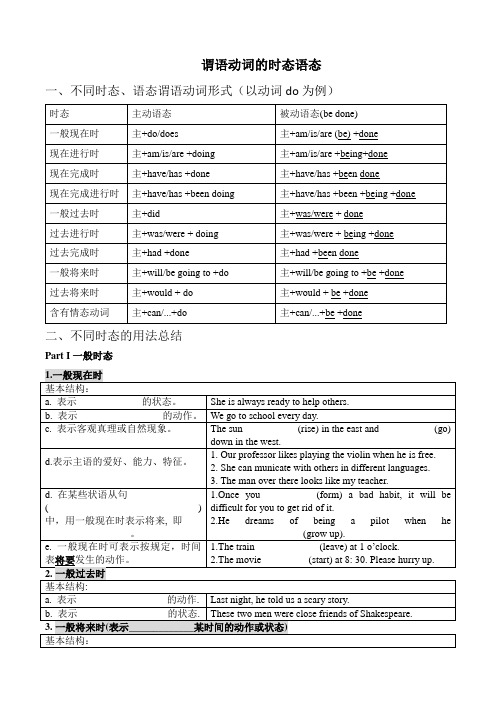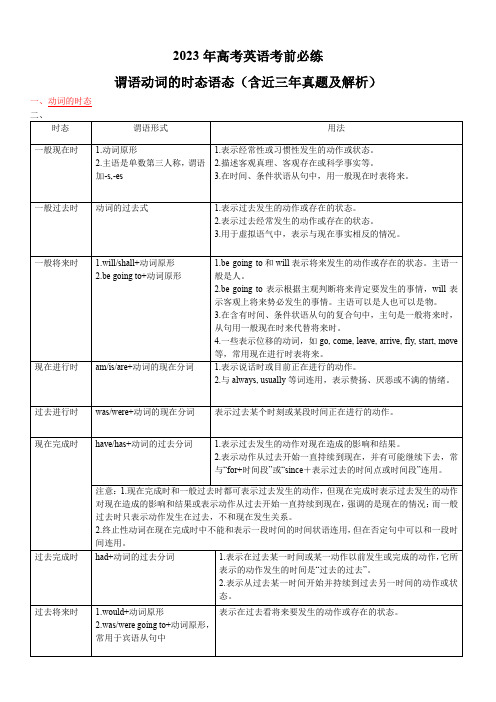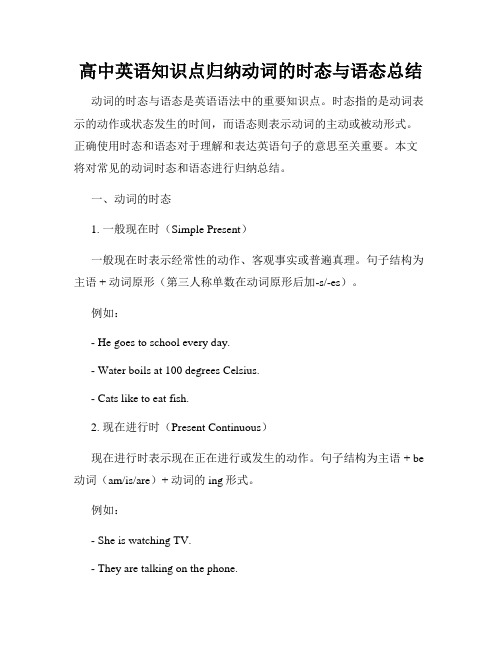高中动词时态和语态复习
高中总复习二轮英语 核心语法必备 专题一 谓语动词(动词的时态、语态、主谓一致、情态动词和虚拟语气)

必
备
专题一 谓语动词(动词的时态、语态、 主谓一致、情态动词和虚拟语气)
英语
内容索引
要点精讲•破疑解难 对点演练•精准提升
要点精讲•破疑解难
重点一 热考的5种时态
考点1 一般现在时(am/is/are或do/does)
用法
例句
表示现在经常性、习惯性、 反复性的动作或状态
Susan talks every night in her dream. It
代词
单个的动词-ing形式、动词不定式或主语从句
重点一
重点二
重点三
重点四
原则
主语
谓语
由and连接的两个并列成分表示两个不同的概念
有生命的集体名词, 如people, police, cattle等 一些常用作复数或只有复数形式的名词, 如goods,
stairs,
arms等
复数
山脉、群岛、瀑布等以-s结尾的专有名词
重点一
重点二
重点三
重点四
提示 用过去完成时的常用句型: ①This/That/It was the first/second/... time+that 从句, 从句用过去完成时。 ② “Hardly/Scarcely had+主语+动词过去分词... when...” 及 “No sooner had+主语+动词过去分词... than...”, 主句用过去完成时, 从句用一般过去时。
By the time Jack returned home from
表示一个动作或状态从过去 England, his son had graduated from 某一时间之前已经开始, 一直 college. 持续到过去这一时刻的动作 杰克从英国回到家中时, 他的儿子已经大
高中时态语态归纳总结导学案高考英语一轮复习

谓语动词的时态语态一、不同时态、语态谓语动词形式(以动词do为例)二、不同时态的用法总结Part I一般时态三、被动语态时态语态专练一.画出下列句子(包括从句)中的谓语动词,并写出其时态语态。
1.This afternoon, we had our chemistry class in the science lab.2. She is studying at an American high school for a year.3. My name is Adam and I’m a freshman at senior high school.4. You should encourage your friend to try new hobbies.5. There, a boat will take you to stay with a local Urus family on an island for three days.6. I’ve been studying English since primary school.7. The team that Lang Ping had built was falling apart.8. One of the best players had been injured, and the team captain had to leave because of heart problems.9. Foreign aid is being organized for the tsunamihit countries.10. China’s ancient civilization has continued all the way through into modern times.11. Some of the symbols can still be seen in today’s hanzi.12. Listening to English radio programme helps me to get used to an English language environment.13. Water from the dam would likely damage a number of temples and destroy cultural relics.14. A mittee was established to limit damage to the Egyptian buildings and prevent the loss of cultural relics.15. Nearly 500,000 highquality digital photographs have been produced since the international project started in 1994.16. Billions of trees are being cut down every day to make paper for humans.17. I sincerely hope that you will be admitted to your ideal university.18. When I was a little child, I once said to my grandmother that I would buy her a big house. 二.用括号里动词的正确形式填空1. A meeting _____________(hold) in Nanjing from March 22 to 24, 2023.2. Then, one day in 1945, Marcel ____________(give) another opportunity by the mountain.3. Since then, Marcel __________(make) mountain climbing his life’s work.4. Spending too much time online ________(make) it difficult to focus on other things in life.5. When I got to the theater, I found out that the tickets __________________________(sell out).6. In the last few years, thousands of films ________________________(produce) all over the world.7. In the near future, more advances in science technology _______________________(make) by scientists.8. The experts are discussing how the cultural relics can _________(save).9. With the help of my teacher, I __________(make) great progress in English so far.10. Tom _________(visit) his grandparents every weekend.11. The problem ______________(solve) sooner or later.12. I ______________(do) my homework in my room as usual when I heard someone screaming.13. The pany _____________(develop) a new app and it will appear on the market next year.14. I went to Ningxia and __________(stay) there for a year.15. Could I use your car? Mine ________________(repair) in the garage now.16. The book __________________(translate) into many languages since it _____________(publish) in 1973.17. He promised that he_____________(marry) me, but three months later he went abroad.18. An autumn outing _______________(hold) next Friday by our school to enrich our school life .19. The China International Search and Rescue Team (CISAR) ____________(form) in 2001 and is now made up of several hundreds of rescue workers and about 20 sniffer dogs.20. Rescue workers ___________(train) to find people, treat injuries, and hand out food, water, and other supplies.21. In 1961, the first temple __________(move) by German engineers.22. When the project ended in 1980, it ___________(consider) a great success.23. This semester is about to end. M y parents and I ______________(travel) to Xi’an this winter vocation.24. On most Sundays, the sounds of hammers and other tools striking stones can ____________(heard) in Xochiaca, an ancient village in Mexico.25. The ChineseCanadian _______(win) the 18th International Chopin Piano petition in Warsaw in 2021 at the age of 24.。
2023年高考英语考前必练 谓语动词的时态语态(含近三年真题及解析)

2023年高考英语考前必练谓语动词的时态语态(含近三年真题及解析)一、动词的时态特殊用法1.在时间、条件和让步状语从句中,如果主句谓语动词是一般将来时,从句用一般现在时。
如:We’ll have a picnic if it is fine next Sunday.如果下个星期日天气晴朗,我们将去野餐。
I’ll call you as soon as I get to Beijing tomorrow.我明天一到北京就给你打电话。
2.某些表示起始、往返、出发、到达之意的动词,可用一般现在时表示按规定、计划或安排将要发生的动作(此时一般都有一个表示未来时间的状语)。
这类动词有:begin, come, go, leave, start, arrive, end, stop, open, close等。
如:The meeting begins at 2:00 p.m. tomorrow.这个会议明天下午2点开始。
The next train leaves at 7 o’clock this evening.下一列火车将在今晚7点离开。
3.现在进行时与always, continually, forever等副词连用,表示反复出现或习惯性的动作,这种用法往往表达说话人的某种感情,如赞扬、遗憾、讨厌或不满等。
如:The rich woman is always laughing at the poor.这个有钱的夫人总是嘲笑穷人。
4.现在完成时中表示短暂动作的动词不能与for, since等引导的时间状语连用。
如与一段时间连用,要把瞬间动词转化为意思相近的延续性动词。
常见的变化有:特殊用法1.open,lock,write,read,sell,clean,wash,cut,drive等词作不及物动词时,它们的主语为物,可用主动语态表示被动意义。
如:This kind of pen writes very smoothly.这种钢笔写起来很流畅。
【高三一轮复习语法】动词的时态与语态(共28张ppt)

②在条件状语从句和时间状语从句中用一般现在时表将来(主将从现)。 If you leave tomorrow , I'll see you at the airport. 如果你明天走,我到机场送你。 When she comes, I'll tell her about it. 她来时我将把这件事告诉她。 (2)现在进行时表将来 现在进行时表示将来,往往是指计划好或准备要做的事。一些表示动作 转换的动词,如go, come, leave, start, begin,stay,take off,arrive等,或 者也称为位移性动词,其进行时表示马上要做某事。
• He used to get up early . 过去他总是早起。(现在不这样了) • He will be used to getting up early . 他将会习惯早起。 • Wood is used to make paper. 木材被用来造纸。
(三)一般将来时
1、表示将要发生的动作或存在的状态,常用的时间状语有later(on), soon, in a month, next time, from now on, tomorrow等。 I shall be eighteen years old next year. 明年我就十八岁了。 2、一般将来时的其它表示形式 (1)一般现在时表将来 ①按照计划或时刻表要发生的事情。 The new library opens next month. 新图书馆下月开放。 The plane takes off at 3:00 P.m. 飞机于下午三点起飞。
We are about to discuss this problem.我们将马上讨论这个问题。 They were about to leave when the telephone rang. 他们正要离开时电 话响了。
高考英语考点精析复习讲义-时态和语态

第六讲时态和语态典型例题1.高考考查的八种动词时态是:一般现在时,一般过去时,一般将来时,现在进行时,过去进行时,现在完成时,过去完成时,过去将来时。
2.考生要学会在具体语言环境下使用具体时态的能力,从NMET对动词时态的考查来看,这几年试题的灵活性正逐步加强。
题干中的有效信息由“外显的”转向“隐蔽的”,情景中可能不出现明显的时间信息。
3.预计动词时态的考核有如下趋势:经常考查时态的基本知识点,考查时注重在实际场合中的交际应用。
试题的立意由简单直接的“结构立意”(如状语从句、宾语从句等)转向了“情景立意”。
试题创设的语境明确,交际情景(对话形式占有一定比例)多是发生在学生学习或日常生活中的真实情况。
4.时态和语态是紧密相连的,高考题中经常把时态和语态一起考查。
应试高分瓶颈1.学习动词的时态和语态时,切不可脱离实际运用的语言,一味死记硬背语法规律的条条框框。
了解了时态的一些常用规则之后,要留心以英语为母语者在实际生活中是如何使用各种时态和语态的。
2.答题时,研读题干,搜索出尽可能多的“时间参照信息”,尤其是动词冗余信息中的时间信息。
发现和有效利用这些信息是解决问题的关键。
3.解决时态和语态问题,要遵循如下解题思路:①这个动作可能发生在什么时间?题千句中可参照的时间信息有哪些?U②这个动作处于什么状态,是进行中,.还是已结束(完成)?限制或修饰这个动作状态信息有哪些?③这个动作与主语的关系,是主动还是被动?只要全面细致地考虑了这些问题的答案,试题的正确答案也就水落石山?时态本类考题解答锦囊高考对时态的考查除了常用的八种时态外,还需注意以下几点:1. if,unless, even it 引导的条件状语从句中,在when, before, until(till), assoon as, the moment, once 弓I导的时间状语从句中,在no matter what / who / which / when / where, / how 或whatever, whoever, whichever, whenever, wherever, however引导的让步状语从句中,如果主句是将来时(往往出现will/ shall / can / must)或主句是祈使句,从句用一般现在时表示一般将来时。
高中英语知识点归纳动词的时态与语态总结

高中英语知识点归纳动词的时态与语态总结动词的时态与语态是英语语法中的重要知识点。
时态指的是动词表示的动作或状态发生的时间,而语态则表示动词的主动或被动形式。
正确使用时态和语态对于理解和表达英语句子的意思至关重要。
本文将对常见的动词时态和语态进行归纳总结。
一、动词的时态1. 一般现在时(Simple Present)一般现在时表示经常性的动作、客观事实或普遍真理。
句子结构为主语 + 动词原形(第三人称单数在动词原形后加-s/-es)。
例如:- He goes to school every day.- Water boils at 100 degrees Celsius.- Cats like to eat fish.2. 现在进行时(Present Continuous)现在进行时表示现在正在进行或发生的动作。
句子结构为主语 + be 动词(am/is/are)+ 动词的ing形式。
例如:- She is watching TV.- They are talking on the phone.- We are studying for the exam.3. 一般过去时(Simple Past)一般过去时表示发生在过去的动作或状态。
句子结构为主语 + 动词过去式。
例如:- I visited my grandparents last weekend.- He studied English in high school.- They went to the concert together.4. 过去进行时(Past Continuous)过去进行时表示过去某个时间点正在进行或发生的动作。
句子结构为主语 + was/were + 动词的ing形式。
例如:- She was cooking dinner when I called her.- They were playing soccer at the park yesterday.- We were watching a movie when the power went out.5. 一般将来时(Simple Future)一般将来时表示将来某个时间要发生的动作。
高中英语知识点归纳动词的语态与时态

高中英语知识点归纳动词的语态与时态动词的语态与时态是高中英语学习中的重点难点之一。
正确掌握动词的语态与时态,不仅可以提高英语写作和阅读的能力,还能帮助我们更好地理解英语语法和文化。
本文将系统性地对动词的语态与时态进行归纳总结,旨在帮助高中生更好地掌握这一知识点。
一、动词的语态动词的语态主要分为主动语态和被动语态两种。
1. 主动语态(active voice)在主动语态中,主语是动作的执行者或者发出者。
主动语态通常由主语+及物动词+宾语构成。
例如:- She writes a letter.(她写了一封信。
)- They are building a new house.(他们正在盖一座新房子。
)- We have eaten dinner.(我们已经吃晚饭了。
)2. 被动语态(passive voice)在被动语态中,主语是动作的承受者或者接受者。
被动语态通常由宾语+及物动词+be动词+过去分词构成。
例如:- A letter is written by her.(一封信被她写了。
)- A new house is being built by them.(一座新房子正在被他们建造。
)- Dinner has been eaten by us.(晚饭已经被我们吃了。
)要注意的是,被动语态中的宾语在主动语态中通常是作为及物动词的宾语出现的。
同时,被动语态还可以通过不定式或现在分词的形式进行表达。
例如:- The meeting is to be held tomorrow.(会议将于明天举行。
)- The book left on the desk is mine.(留在桌子上的书是我的。
)二、动词的时态动词的时态主要包括一般现在时、一般过去时、一般将来时、现在进行时、过去进行时、过去将来时、现在完成时、过去完成时等。
1. 一般现在时(simple present tense)一般现在时表示现在经常或习惯性发生的动作或存在的状态。
专题01 动词的时态及语态(原卷版)(全国通用版)-高考英语复习

专题01 动词的时态及语态时态知识梳理重点用法1 一般现在时用法:1.be(am,is,are)动词的使用由主语的人称和数决定。
行为动词的第三人称单数加-s/es,其余人称用动词原形。
I am free tonight.我今晚有空。
The boy is ten years old.这个男孩10岁了。
They are students.他们是学生。
Bill often helps others.We like him a lot.比尔总是帮助他人。
我们很喜欢他。
2.表示经常、习惯性发生的动作或存在的状态。
It often rains in our city.我们的城市经常下雨。
3.表示普遍真理和客观真实。
The earth moves round the sun.地球围绕太阳转。
4.表示心理状态或情感的动词往往用一般现在时。
She hates rock music.她讨厌摇滚乐。
5.在时间、条件状语从句中表示将来的动作。
I will call on you as soon as I am free.我空闲时会去拜访你。
提示:一般现在时可以用来代替一般将来时,表示已经预先计划或安排的肯定将要发生的动作,句中常有表示将来时间的状语。
这一用法主要用于下列动词,如果arrive(到达),be (是),begin(开始),come(来到),go(去),leave(离开),reach(到达),start(出发)等。
The train leaves at eight o’clock.火车8点钟开车。
注意:一般现在时常用的时间状语有:today今天often经常always一直sometimes有时usually通常seldom很少on Sunday在星期天every day/week/morning每天/每周/每天早上重点用法2 一般过去时用法:1.be(was/were)动词的使用由主语的人称和数决定。
行为动词都要用过去式。
- 1、下载文档前请自行甄别文档内容的完整性,平台不提供额外的编辑、内容补充、找答案等附加服务。
- 2、"仅部分预览"的文档,不可在线预览部分如存在完整性等问题,可反馈申请退款(可完整预览的文档不适用该条件!)。
- 3、如文档侵犯您的权益,请联系客服反馈,我们会尽快为您处理(人工客服工作时间:9:00-18:30)。
高中动词时态和语态复习( ) 1. Don’t make so much noise. We _______ to the music.A. listenedB. listenC. are listeningD. have listened ( ) 2. I must return the camera to Li Lei. I _______ it for two weeks.A. keepB. borrowedC. have keptD. have lent ( ) 3. –When will you tell him the good news?--I will tell him about it as soon as he _______ back.A. comesB. cameC. will comeD. is coming ( ) 4. –Dad, please open the door, it _______. –OK, dear. I’m coming.A. locksB. lockedC. is lockedD. was locked ( ) 5. –Did you go to Jim’s birthday party? --No, I _______.A. am not invitedB. wasn’t invitedC. haven’t invitedD. didn’t invite ( ) 6. A talk on Chinese history _______ in the school hall next week.A. be givenB. has been givenC. will be givenD. will give ( ) 7. So far I _______ any success. However, I’ll keep trying.A. don’t haveB. didn’t haveC. haven’t hadD. won’t have ( ) 8. We when he turned up.A. leftB. were about to leaveC. had leftD. will leave ( ) 9. ( ) There __________ a meeting tomorrow afternoon.A. will be going toB. will going to beC. is going to beD. will go to be( ) 10. Charlie ________ here next month.A. isn’t workingB. doesn’t workingC. isn’t going to workingD. won’t work ( ) 11. –Did you see Tom at the party? -- No, he _______ by the time I got there.A. leftB. was leavingC. had leftD. has left ( ) 12. –Why not go to see the dolphin show with me? --Because I ______ it.A. sawB. will seeC. seeD. have seen ( ) 13. ---I have got a headache.---No wonder. You _______in front of that computer too long.A. workB. are workingC. have been workingD. worked ( ) 14. Catherin _______ the letter before her mother came into her bedroom.A. has writtenB. was writtenC. had writtenD. is writing ( ) 15. The old man is quite weak after the accident, so he _______.A. must take care ofB. must be take care ofC. must look afterD. must be looked after( ) 16. —I’m sure Andrew will win the first prize in the final.—I think so. He ________ for it for months. (2008江苏)A. is preparingB. was preparingC. had been preparingD. has been preparing ( ) 17. I ____ my grandmother at three this afternoon.A. shall be visitingB. shall have visitedC. shall be visitingD. will visit ( ) 18. How long have you _______ the book?A. boughtB. lentC. hadD. borrowed ( ) 19. –Do you know him well ? --Sure. We _____ friend since ten years ago.A. wereB. have beenC. have becomeD. have made ( ) 20. It was the third time that I _______ in at his office.A. have droppedB. had droppedC. droppedD. was dropping ( ) 21. If Mary _______ next Sunday, we will go boating together.A. will comeB. comesC. shall comeD. should come ( ) 22. We expected that the English teacher _______ some advice on how to write an English letter.A. will giveB. gaveC. is going to giveD. would give ( ) 23. Every spring, many trees _______ along the river.A. were plantedB. is plantedC. will be plantedD. are planted ( ) 24. When her father came back home, Joan _______ with her friend.A. talkedB. talksC. is talkingD. was talking ( ) 25. What _______ the forest in our country in the last ten years.A. has happened doB. is happened toC. has happened atD. is happening ( ) 26. His uncle _______ in three days.A. returnsB. has returnedC. returnedD. will return ( ) 27. –Hi, Lin Tao. I didn’t see you at the party.--Oh, I _______ ready for the maths exam.A. am gettingB. was gettingC. gotD. have got ( ) 28.–Be careful! You might fall into the water.--Thank you. I ______ I _______ so close to the pool.A. didn’t know; am standingB. don’t know; am standingC. didn’t know; was standingD. didn’t know; would stand( ) 29. –Excuse me. Where is the sick boy sent here a moment ago?--He ______ by the doctor.A. has been examinedB. will be examinedC. is examinedD. is being examined( ) 30. —Have you got the airplane tickets?--No. when I _______ to the office, all the tickets to Beijing ______ out.A. get; have been soldB. got; had been soldC. got; had soldD. got; were being sold( ) 31. ---- Whom are you waiting for?----Gary’s parents. But neither of them _______ yet.A. arrivedB. has arrivedC. are arrivingD. is arrivingFill in the blanks with the right forms of the given verbs.1.He _______(go) out an hour ago.2.He _______(be) out for an hour.3.They _______ (visit) this national park twice this month.4.They _______(tour) Paris for two weeks. They are going back home next week.5.--–Sorry, I’m late.----Where have you been? We _______ (wait) for you since 6:00 p.m.6. It is the first time that I ______(see) this kind of cellpho ne.7.Listen to the two girls by the window. What language ______ (they, speak)?8.The girl (always talk) aloud in public.9.He (arrive) in Beijing tomorrow.10. I (attend) the meeting at 10:00 next Sunday.11. She (travel) in Beijing all next week.12. In the past few years, great changes ____(take place) in my hometown.13. I ____ (mean) to help you, but I was too busy at the moment.14.Hardly ___ we___ (start) when the car got a flat tyre.15. The girl (always talk) aloud in public.16. The sun rises in the east and ____(set) in the west.17. You needn’t be in a hurry. The train(leave) at six.18.I felt a little nervous when I ________(面试).2011年湖南卷22. -----Joan, what _______ in your hand?-----Look! It’s a birthday gift for my grandma.A. had you heldB. are you holdingC. do you holdD. will you hold27. In 1492, Columbus__ __on one of the Bahama Islands, but the mistook is for an island offIndia. A. lands B. landed C. has landed D. had landed30. It is most instructive lecture that I _______ since I came to this school.A. attendedB. had attendedC. am attendingD. have attended34. In the near future, more advances in the robot technology _______ by science.A. are makingB. are madeC. will makeD. will be made2012湖南卷22. Don’t worry. The hard work that you do now ______later in life.A. will be repaidB. was being repaidC. has been repaidD. was repaid25. Close the door of fear behind you, and you ___ the door of faith open before you.A. sawB. have seenC. will seeD. are seeing27. "The moment _____soon," he thought to himself, waiting nervously.A. cameB. has tomeC. was comingD. is coming33. ----I remember you were a talented pianist at college. Can you play the piano for me?- --Sorry, I the piano for years.A. don't playB. wasn't playingC. haven't playedD. hadn't played2013湖南卷22. ―What do you want to be?‖ asked Mrs. Crawford. ―Oh, I ________ president,‖ said the boy,with a smile.A. have beenB. amC. wasD. will be24. Around 2:00 every night, Sue will start talking in her dream. It somewhat _______ us.A. bothersB. had botheredC. would botherD. bothered26. If nothing ________, the oceans will turn into fish deserts.A. doesB. had been doneC. will doD. is done27. — Have you heard about the recent election?— Sure, it ________ the only thing on the news for the last three days.A. would beB. isC. has beenD. will be34. —I don’t understand why you didn’t go to the lecture yesterday afternoon.—I’m so sorry. But I ______ my homework. (2013年湖南卷)A. had doneB. was doingC. would doD. am doing。
